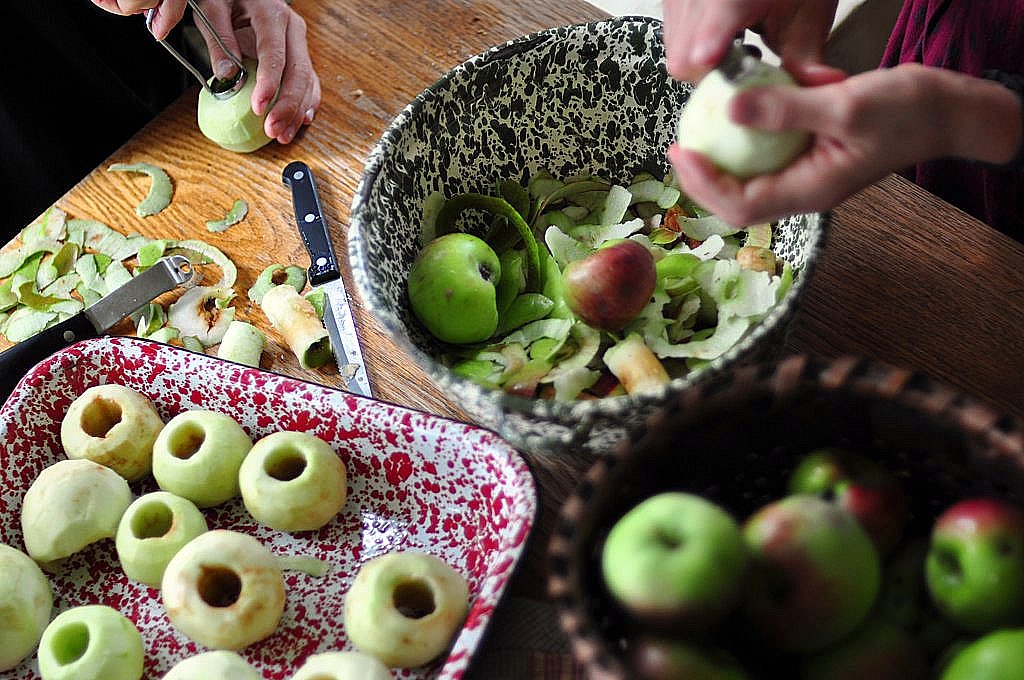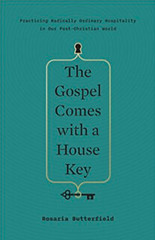Frankly, the word “hospitality” often invokes the image of a gracious host welcoming guests into a beautiful home, serving perfectly presented meals. Yeah, that. However, the biblical call to hospitality goes much deeper, leading Christians to consider strangers as neighbors — and neighbors as family. In her new book, The Gospel Comes with a House Key, Rosaria Butterfield explains how “radically ordinary hospitality” can be an unexpected key — that each of us hold — for bringing the gospel to lost friends and neighbors. With engaging stories from her own life-changing encounter with radically ordinary hospitality, she equips Christians to use their homes as a means to showing a post-Christian world what authentic love and faith really look like. It’s a grace to welcome Rosaria to the farm’s front porch today…
guest post by Rosaria Butterfield
So, it turns out that our little neighborhood (made up of three hundred houses in the city of Durham, North Carolina) uses a social media app called Nextdoor.
And — it turns out — this is the only form of social media in which I actually, participate.
Because, I’m kinda crazy enough to think that if I am going to post a picture of my lunch — I want to be able to share it with those with whom I might actually share this lunch— my neighbors.
So I read Nextdoor updates daily, and I receive messages as they are posted so that I can respond to and pray for the neighbors whom I do not yet know.
I pray about lost dogs, and I donate school supplies. Every time someone posts a request for meals for a sick, grieving, or newly blessed-by-newborn neighbor, I’m on it. I look carefully at the food allergies and preferences. Over the years, I have developed go-to recipes for a variety of food needs.
My husband, Kent, and I believe that practicing daily, ordinary, Christian hospitality is worth the cost—even if it doubles our grocery budget (or sometimes triples it!).
It costs money and time and heartache to run a house that values radically ordinary hospitality and nightly table fellowship, and we are all in.













Over the past sixteen years of marriage, we have given away a lot of things.
We give away many meals each week (those we serve here, those we serve at church, those we send in Pyrex pans to neighbors who have new babies or new knees, and those we mail to brothers and sisters in prison via iCare packages).
We give away our time. We share our house. We don’t rent space in our house. If we did that, we wouldn’t be able to give it away.
We give away cars when we have had the means to do so.
We have never suffered for the absence of anything.
Paul’s words ring in my ears: “To me, though I am the very least of all the saints, this grace was given, to preach to the Gentiles the unsearchable riches of Christ, and to bring to light for everyone what is the plan of the mystery hidden for ages in God, who created all things” (Eph. 3:8–9). I like better the King James rendering: “And to make all men see what is the fellowship of the mystery . . . ”
Christian hospitality brings together the mystery of union with Christ and the fellowship of the saints to gather in close the stranger and the outcast and the chronically lonely.
We make gospel bridges into our home because we notice the people around us and their needs.We see people whom God has put into our lives—especially the difficult ones—as image bearers of a Holy God and therefore deserving of our best.
Hospitality is image-bearer driven, because Christ’s blood pumps me whole. It is not time, convenience, and calendar driven. If it were, none of it would happen. None of this grace would be mine to hold and to share.
Hospitality requires daily Bible reading, deep repentance, dark mornings in solitude, and the daily willingness to forgive others whether or not they ask.
Hospitality renders our houses hospitals and incubators. When I was in a lesbian community, this is how we thought of our homes. I learned a lot in that community about how to shore up a distinctive culture within and to live as a despised but hospitable and compassionate outsider in a transparent and visible way. I learned how to create a habitus that reflected my values to a world that despised me.
I learned to face my fears and feed my enemies.
Engaging in radically ordinary hospitality means we provide the time necessary to build strong relationships with people who think differently than we do as well as build strong relationships from within the family of God.
Radically ordinary hospitality shows this hurting world what authentic Christianity looks like.So here I am, a new creature in Christ, yes, but still wearing my Birkenstocks. Lobotomized, no. A beneficiary of God’s grace, both common and saving, with eyes wide open to behold what contagious grace looks like—and what it does to people and the world and the church. And my house, by God’s grace, is still an incubator and a hospital.
As we grow to be more like Christ in practicing daily, ordinary, radical hospitality, the Lord blesses richly for it, adding to His kingdom, creating a new culture and a new reputation for what it means to be a Christian to the watching world.
As we practice daily, ordinary, radical hospitality — strangers become neighbors, and neighbors become the family of God…
And our hearts, homes, and lives find the key to greater joy.
Rosaria Butterfield (PhD, Ohio State University) is an author, speaker, pastor’s wife, homeschool mom, and former tenured professor of English and women’s studies at Syracuse University. She is the author of The Secret Thoughts of an Unlikely Convertand Openness Unhindered.What did God use to draw a radical, committed unbeliever like Rosaria to himself? Did God take her to an evangelistic rally? Or, since she had her doctorate in literature, did he use something in print? No, God used an invitation to dinner in a modest home, from a humble couple who lived out the gospel daily, simply, and authentically.
With this story of her conversion as a backdrop, Rosaria Butterfield invites us into her home in her new book The Gospel Comes with a House Key: Practicing Radically Ordinary Hospitality in Our Post-Christian World to show us how God can use this same “radical, ordinary hospitality” to bring the gospel to our lost friends and neighbors.
[ Our humble thanks to Crossway for their partnership in today’s devotion ]








